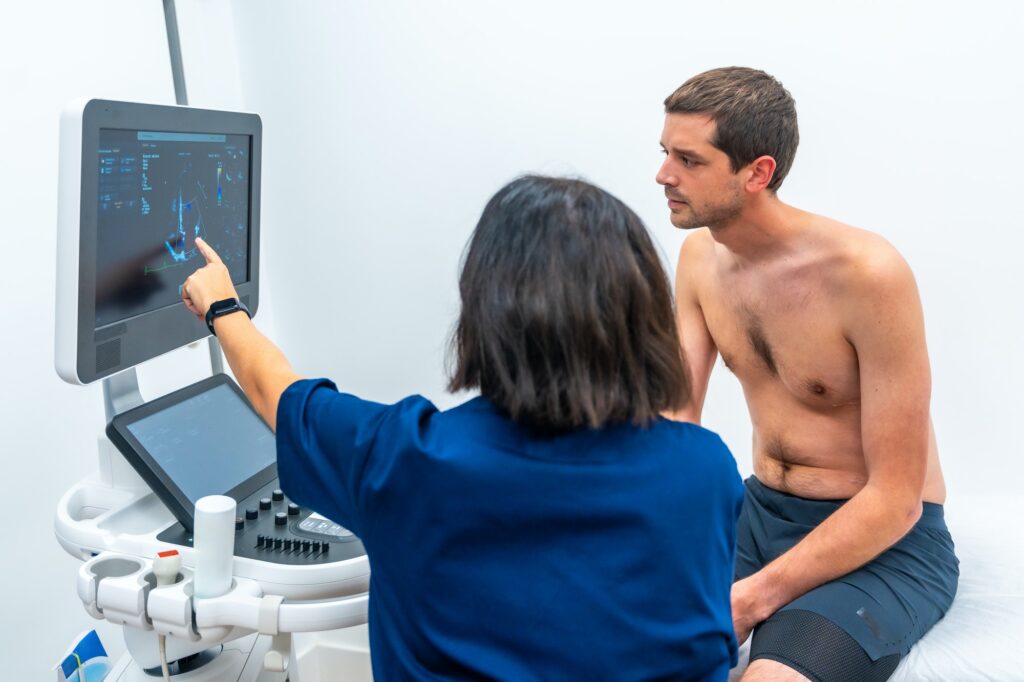Dobutamine Stress Echocardiogram
- Home
- Our Services
- Dobutamine Stress Echocardiogram
- All Services
- Cardiologist Consultation
- Stress Echocardiogram
- Dobutamine Stress Echo
- Echocardiogram
- 24 Hour ECG Monitor
- 24 Hour BP Monitor
- ECG
- Heartbug

Indications
Dobutamine Stress Echocardiogram indications are the same as Stress Echocardiogram, specifically for those with muscular skeletal limitations who are unable to exercise on a treadmill.
Here are a few other specific situations where a Dobutamine Stress Echocardiogram might be indicated:
- Assessing Coronary Artery Disease (CAD): This test is useful for detecting and evaluating the severity of CAD, particularly in people who can't do a treadmill stress test.
- Evaluating Heart Function: Dobutamine Stress Echocardiogram can be used to assess heart function in patients with heart failure or other cardiac conditions.
- Evaluating Chest Pain: If you have unexplained chest pain, or if pain is thought to be heart-related, this test may be used to determine the cause.
- Checking the Effectiveness of Treatment: For patients who have undergone treatment for heart disease (like angioplasty, stenting, or bypass surgery), this test can be used to check the effectiveness of the treatment.
- Preoperative Assessment: It can be used as part of a preoperative assessment in patients undergoing non-cardiac surgery, especially those with known CAD or multiple risk factors for CAD.
- Determining Exercise Capacity: It helps determine exercise capacity and prognosis in patients with known cardiac disease, especially when a standard exercise test can
What is a Dobutamine Stress Echocardiogram?
A Dobutamine Stress Echocardiocardiogram (Echo) is a heart test that combines a regular ultrasound of your heart with a drug called dobutamine. This test simulates the effects of exercise on your heart and blood circulation, making it ideal for those who cannot physically exercise during a standard stress echocardiogram due to health issues, joint problems, poor leg circulation, lung problems, or old age.
What can I expect during the test?
You’ll be asked to lie on your left side on a couch for the test. ECG electrodes are attached to your chest to monitor your heart’s electrical activity, while a blood pressure cuff placed on your arm checks your blood pressure every few minutes automatically.
An intravenous line, or IV, will be inserted into your arm for administering the dobutamine. As the dose of dobutamine increases, your heart will start beating harder and faster, just like it would during physical exercise. It’s normal to feel some chest discomfort, nausea, or shortness of breath. We continuously take ultrasound images of your heart throughout the test. Please inform us if you feel anything uncomfortable or unusual during the procedure.
What Happens After the Test?
Once the test is over, we stop the dobutamine and your heartbeat will return to normal. We then remove the IV and you can go home. Feeling slightly tired after the test is normal, but you should return to feeling normal soon. If you encounter any problems or have questions, contact your doctor. The results will be discussed with you after the test, and we’ll also discuss any further follow-up or ongoing treatment needed. Both your referring doctor and local GP will also be informed of the results.
What are the risks of the test?
Ultrasound is known to be safe for clinical use. The dobutamine test is quite safe and is commonly performed on patients who experience chest pain or other symptoms that prevent them from exercising. A few might experience minor heart palpitations or facial flushing, but these symptoms disappear quickly once the test is stopped. Symptoms such as chest pain, breathlessness, or dizzy spells usually stop once the test is concluded.
Dobutamine Stress Echocardiography is frequently used in patients with suspected or confirmed coronary artery disease. There is a very small risk of serious side effects like a heart attack or stroke, but these are very rare.
Preparation
(This test will take up to 60 minutes including the test, preparation and recovery time.)
Pre-Test Preparation
- Fasting: Do not eat or drink anything for 1 hour before the test.
- Avoid Caffeine: Refrain from consuming caffeine 24 hours prior to the test.
Medication Restrictions
Certain medications, specifically Beta blockers and Calcium channel blockers, must be stopped 48 hours before the test. These medications are typically prescribed for heart conditions and high blood pressure.
- Beta-blockers: Used to manage blood pressure, heart rate, and heart function.
- Generic names: Atenolol, Bisoprolol, Carvedilol, Flecainide, Ivabradine, Labetalol, Metoprolol, Nebivolol, Oxprenolol, Pindolol, Propranolol, Sotalol.
- Brand names: Anselol, Atehexal, Felodipine, Noten, Tenormin, Bicor, Dilatrend, Kredex, Tambacor, Coralan, Presolol, Trandate, Betaloc, Lopresor, Metohexal, Metrolol, Metrol, Minax, Toprol-XL, Nebilate, Corbeton, Barbloc, Visken, Deralin, Inderal, Cardol, Solavert, Sotab, Sotacor, Sotahexal.
- Calcium Channel Blockers: Lower blood pressure and prevent chest pain.
- Generic names: Diltiazem, Verapamil.
- Brand names: Auscard, Cardizem, Coras, Diltahexal, Dilzem, Vascocardol, Anpec, Cordilox, Isoptin, Vercaps, Verhexal.
Note: Only stop these medications if it is safe to do so. Consult your referring doctor for advice, and inform us of any changes.
Important Information to Share with Your Doctor
- Pregnancy or Breastfeeding: Inform your doctor if you are pregnant, suspect you might be, or if you are breastfeeding. Dobutamine may affect the fetus and can pass into breast milk.
- Allergies: Notify your doctor about any allergies or sensitivities, especially to medications or latex.
Request an Appointment with Heartscope.
Call us or submit a request form to make an online booking.

